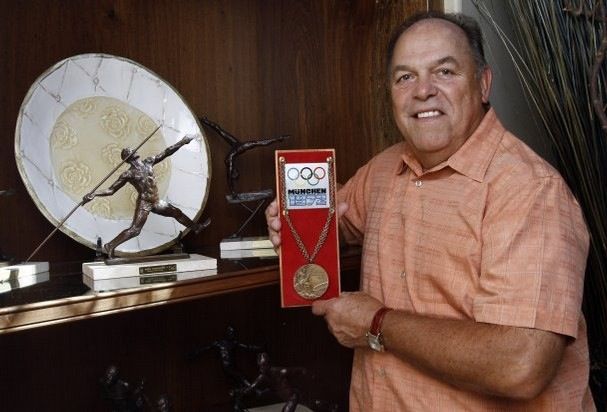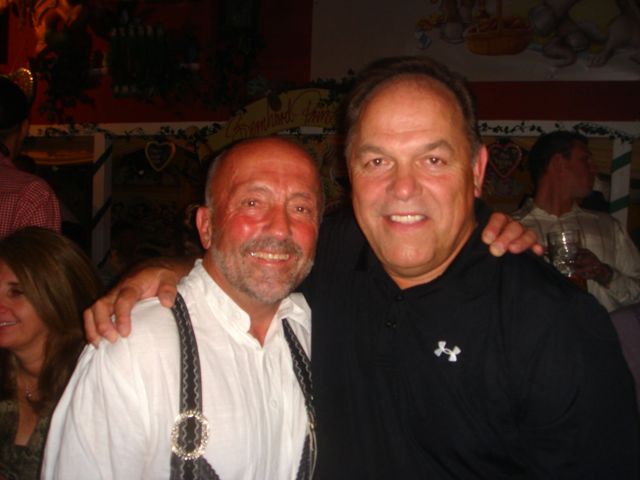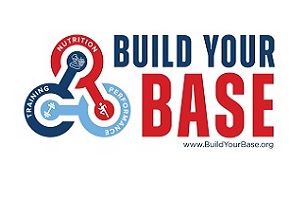Javelin Legend, Bill Schmidt - Spearhead of ChicagoLand Throwers Challenge
The Games of Montreal, Los Angeles, Seoul, Barcelona, Atlanta, Sydney, Athens, Beijing and London have flown on by and Bill Schmidt remains a solitary figure on the American track and field stage.
He took the bronze medal in the javelin back at Munich in 1972 and no Team USA spear-man has been invited to the Olympic podium in all those Games since.
So the natural question: "How great an honor is it to hold this distinction for
going-onto 41 years?"

And Bill Schmidt, a team man all the way, one of the most dedicated supporters of the Olympic cause you will ever meet, will tell you that (a) he's not really thrilled with his status, and (b) he really feels awful that Team USA has endured a zero-for-nine Games medal blanking in the men's javelin department.
"It is more than about time," he tells you. "It is long-long overdue."
So it's no wonder that the arrival of the next great American jav man - someone able to chuck it out with the best of the rest of the globe - is so eagerly awaited.
Sure Bill Schmidt frets over this situation. But sure, too, he's doing something about it.
Coming to the world-class throwing facilities at Benedictine University in Lisle, Illinois on Saturday, June 8, is the Chicagoland Throwers Challenge, the innovative event that will bring 32 of the top high school throwers in the nation to share the venue - and maybe the headlines - with many of the leading national-level throwers.
The event - for the top tossers, male and female, in the shot put, discus. hammer and javelin - is staged under the auspices of the National Scholastic Athletics Foundation and the support of USA Track and Field's High Performance Division.
The youngsters will go at it with their senior counterparts in a brilliantly-conceived series of head-to-head events. Just one concession to the age differential will be made - the high schoolers will throw high school implements.
"Point men" for it all are Chicagoland meet director Tom Pukstys, the two-time Olympian, six-time-national champion and still the third-longest throwing man in American history; along with the NSAF's Jim Spier and Joy Kamani.
But "spear-head" - a most appropriate designation - of the Throwers Challenge is Bill Schmidt.
At 65, the Knoxville, Tenn. resident is recognized as one of the nation's leading sports marketing executives, the career he began not long after his world-class throwing days ended.
In both 1996 and 1998, he was named "one of the 100 most powerful people in sports" by The Sporting News.
He's done it all in the world of sports marketing - Director of Sports at the 1982 Knoxville World's Fair; Director of Development for the Stokely Van Camp Co.; Vice President of Sports at the 1984 Los Angeles Olympic Games; Vice President of World Wide Sports Marketing for Quaker Oats' Gatorade Division; CEO of Oakley, Inc., all the way to his present role as President of the Knoxville-based Pegasus Sports Marketing.
He's the man who signed Michael Jordan to a Gatorade endorsement contract, and he's worked an array of other major high-profile deals over the years.
But he's never strayed too far from his track and field roots, either.
Arranging the wherewithal to make the Chicagoland Throwers Challenge a reality is obviously right up Bill Schmidt's alley. For the young thowers it will be their "baptismal of fire." "Every athletes needs something like this," he tells you. "You'll never know how good you can be until you're forced to raise your sights, to compete against the best, and learn from the whole experience."
Schmidt had many such "baptismal" moments in his own brilliant career. He'd been an excellent thrower - as well as standout football linebacker and baseball player - in his days (Class of 1965) at Canon McMillan High School in Canonsburg, Pa., south of Pittsburgh. Still, he chose throwing the javelin as his sport of choice for college and headed to North Texas State University without benefit of a scholarship.
"They told me I'd get one if I proved myself."
Did he ever.
From a 204-4 best in high school, he improved to 219-2 as a sophomore, 253-1 as a junior and rocketed all the way to 280-7 as a senior.

He popped that 280-7 breakthrough at the Modesto Relays, a meet that drew global attention since it came before the cameras of ABC-TV's "Wide World of Sports."
Pretty good, you might say, without benefit of a coach who knew a thing or two about the jav in either high school or college.
Schmidt took the silver medal as a senior in the 1970 NCAA Championships - back of
Tennessee's Bill Skinner - and soon was off to bigger and better things. As a Army Specialist-4, he was named to the All-Army team and sent to the 1971 CISM (World Military) Games in Turku, Finland.
And there in Finland, the land where javelin throwers are folk heroes, he surprised all his rivals and took the CISM gold medal with a 273-foot performance. "To win it was very special," said Schmidt. "To win it in Finland even more so."
It proved just the confidence-builder he needed heading into the 1972 Olympic-year campaign. (Bill is shown above with 1972 Olympic Gold Medalist, Klaus Wolfermann of Germany)
The nation was loaded with top javelin talent at the time. Getting to the top of the domestic heap was never easy. He placed just fourth at the 1972 AAU Nationals - back of Fred Luke, Milt Sonsky and John Kaveny, but earned his trip to the Munich Olympic Games, 15 days later, by winning the USA Trials in Eugene, Oregon with a 270-6 heave that beat out Sonsky (267-11) and Luke (267-9) as that trio became the Munich team. Jack Bacon, Les Tipton and Bob Wallis, the 4-5-6 finishers, were never close to unseating the top three.
The real adventures came in Munich - the Games forever stained by the blood of the slain Israel team members, and marked by the mishaps endured by such American teammates as Eddie Hart and Rey Robinson (100), Jim Ryun (1500), Bob Seagren (pole vault) and George Woods (shot put.) Schmidt narrowly missed a disaster of his own.
"The bus due to take me from the Olympic Village to the stadium, it never arrived," he said. Desperate that he, too - like sprinters Hart and Robinson - might miss his event, he fled the Village on foot, for a nerve-wracking, energy-sapping jog of three miles-plus to the stadium. "So that became my warmup."
And then another fright - the stadium gatekeeper refused him entrance, saying his event had already been called."So I did what I had to - I just pushed him aside and ran inside." The other throwers had already had their formal warmups as Schmidt arrived. His first two throws of the qualifying round were sub-par stutter-stepping efforts.

Needing an 80-meter throw for an automatic qualifier to the next day's final, the best he could manage was a 78-meter effort, which put him in seventh place.
With his hopes of making the 12-man final sagging - an array of top throwers were set to compete in the second flight - he headed back to the Village, unsure of his next day's status, fearing the worst but still hoping for the best.
Hours later, a teammate finally told him, "Bill, you made it into the final." Fortuitously, so did American teammates Fred Luke and Milt Sonsky.
"That night, the three of us got together," said Schmidt. "Luke, Sonsky and me. We knew how good (world-leaders) Janis Lusis (the Latvian competing for the Soviet Union) and Klaus Wolfermann (of Germany) were, but we all agreed that 'one of us could win the bronze medal.' ''
The final evolved into one of the most dramatic Olympic javelin finals ever.
Wolfermann finally won it by the closest of margins, two centimeters. He threw it 90.48 meters (296-10) to Lusis' 90.46 (296-8.) Schmidt's 84.42 (277-0) claimed the bronze medal and when Luke placed eighth and Sonsky 10th, USA had its best-ever three-man Olympic javelin finish.
In an irony of ironies, USA's Kate Schmidt (no relation) won the bronze medal in the women's javelin at Munich in 1972. And they share the same birthday, December 29 - he was born in 1947, she in 1953.
Schmidt placed seventh at both the 1976 and 1980 USA Olympic Trials. He'd won the 1978 Nationals - beating rising star Bob Roggy - and Track and Field News named him America's "javelin thrower of the decade" for the 1970s.
Apart from his business duties these days, Schmidt serves as an adjunct professor in Tennessee's Department of Exercise, Sport and Leisure Studies, and is a personal coach to such talents as Kimberly Hamilton, third-place finisher in the 2012 USA Olympic Trials women's javelin.
Once in his sport's brightest spotlight, Schmidt is now happy to play his behind-the-scenes role. He lauds the National Scholastic Athletics Foundation - "they do an incredible job for the youth of the nation. " At the same time, all those stars of the future need to know that a man named Bill Schmidt is helping them build futures that may, just may, match his own.
All they have to do is work at it, and show the heart, the soul, the passion, that Bill Schmidt displayed every time he stepped onto a javelin runway.



